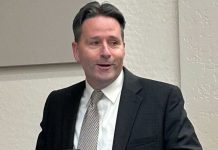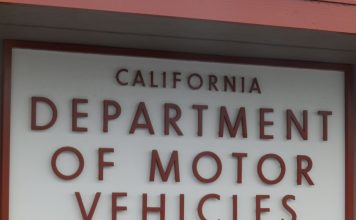Residents have two more days to file their tax returns, and
places like H
&
amp;R Block will keep doors open late to accommodate.
Residents have two more days to file their tax returns, and places like H&R Block will keep doors open late to accommodate.
Gilroy resident Alex Diaz, 26, was finishing his tax return at the H&R Block near First and Princevalle streets Monday afternoon. He would have had it done sooner, he said, had his wife not given birth to a baby girl Thursday, sidetracking him over the weekend.
“I’m just doing this late, last-minute stuff,” Diaz said as he held up a tax document while his son Alex, 6, crawled out of the family’s Jeep. “They take care of me here at H&R. They do an excellent job every time, and that’s why I come back every year.”
Less than 20 percent of Americans brave the exam without help. Inside H&R Block, Manager Linda Frantzich said the flow of tax-filers was about the same as last year, but she declined to say how many returns the office had filed out of California’s 16.2 million, which contribute to the nation’s 92.3 million expected returns this year and which is down from 96.8 million last year, according to the IRS. About 303 million people live in the United States and 33.9 million in California, according to census figures.
Even with the proliferation of so-called e-files, whereby taxpayers complete their returns online through a variety of IRS-ordained services, Frantzich said H&R Block was still working with people who attempted to do it on their own but who came in to double check.
“We find errors on four out of five returns when we do a second look,” Frantzich said in front of about seven people who waited for help in the lobby Monday. The office will open early at 8 a.m. and close at 9 p.m. Tuesday and Wednesday, the final deadline for returns.
As of April 3, online filings nationwide – which actually began in seven cities in 1987 – increased by more than 3.5 million, or 5 percent, to nearly 71 million compared to last year, IRS Spokesman Jesse Weller said.
“The benefit to e-filing is that it is the fastest and easiest and safest and most accurate way to file your taxes,” Weller said. “The error rate for paper returns is about 20 percent, whereas e-filing is less than 1 percent” thanks to computerized predictions and calculations. Plus, online filing guarantees faster returns, he said.
The deadline to request an extension on filing taxes is also April 15, and the IRS expects to receive more than 1.6 million requests from Californians and almost 10 million nationwide this year, Weller said. The extension allows taxpayers until Oct. 15, but it does not give them an extended pay plan: Those who owe taxes can make a payment when they file the extension either by mailing a check or by several electronic payment methods, Weller said.
“We want everyone to file electronically, even for their extensions,” Weller said.
The U.S. Post Office at the intersection of Fourth and Eigleberry streets will stay open during regular business hours, 9:15 a.m. until 5 p.m., Tuesday and Wednesday, according to Gilroy Postmaster Penny Yates, who said she files her taxes through a private service.
“Traffic this year is not anything like it used to be,” Yates said Monday. “There will probably be a rush tomorrow and the actual tax day, but most people file online or they do it through a tax service.”
The UPS Store, 353 10th St., will also maintain normal business hours Tuesday and Wednesday, from 9 a.m. to 6:30 p.m.
The nation’s tax code is almost 3 inches thick in fine print accompanied by a foot-tall document of IRS regulations backed by 25 volumes of explaining “summaries” that fill 9 feet of shelf space. The 6.7-million-word riddle that determines what you owe Washington is the enemy of simple. And it’s getting more aggressively convoluted all the time.
The changes in tax code since 2001 average out to more than one daily, including 500 in 2008 alone. The size of the code has tripled since 1975. Not one, but two newsletters publish up to 500 pages daily to keep professionals clued in to the shifting U.S. tax landscape.
The IRS is not the real bogeyman here. As an independent nonprofit that investigates and exposes corruption and other misconduct, the Project on Government Oversight determined decades ago that the enemy is us – or at least those people on Capitol Hill so intent on pleasing us. Deduction for your home mortgage interest? Few homeowners would part with that savings. A break for home energy conservation or a hybrid car? Green is gold. Allowances for college bills? Every little bit helps. And so it goes.
But the sum total of good intentions piles on one after another, making for an April 15 nightmare.
“On the one hand, taxpayers who honestly seek to comply with the law often make inadvertent errors, causing them either to overpay” or pick a fight with the taxman, says a report by the IRS taxpayer advocate. “On the other hand, sophisticated taxpayers often find loopholes that enable them to reduce or eliminate their tax liabilities.”
Consider Josh Gregory, who makes a modest living delivering pizzas, giving dance lessons and performing with a fire dance troupe. The 27-year-old Kansas City resident walked into Liberty Tax Service earlier this month with an accordion folder, a handful of forms, a spiral notebook and some anxiety about getting this thing right.
“There are some things that I’m confused about,” he told his tax preparer, Susan Waterman.
Last year, he came with a small blizzard of random papers, and both filer and preparer ended up sprawled on the floor trying to make sense of things. He’s become more organized, but a puzzle still lies ahead.
Since he lives in a loft that’s rented in the name of one of his ad hoc businesses, are repairs there deductible? Probably not. What about costumes and props for the dance group? Sure. Mileage delivering pizzas and driving to performances and lessons? Yeah, but how well documented are those trips?
One of the theatrical companies he earned money from put a dollar amount in the wrong box on his 1099.
“Let’s just put it in the right one,” Waterman said. But that brings with it the fear that somewhere down the line an IRS examiner will see that correction as a mistake, or at least as an inconsistency.
Even as Waterman is guided by her company’s software and her own accounting background, things come up as asides in their conversation. Two other people with the same facts but a different rapport might miss some options – and produce a different return.
Now the IRS is sending signals that tax preparers will be more subject to penalties if they knowingly push a taxpayer beyond the limits.
“The message is clear. They want more uniformity. They want better compliance,” said J. Harlen Stamper, a tax attorney.
At the Tax Institute, operated by tax preparation behemoth H&R Block, executive director Amy McAnarney said confusion and fretfulness are driving more people to turn to professionals.
“There are so many moving parts in the tax code, more people are thinking that maybe it’s time to see an expert,” she said.
The company’s surveys find that 72 percent of Americans say they are not aware of changes in tax laws. Nearly as many didn’t know they could amend mistakes in previous years _ and get returns for overpayments.
In 2006, taxpayers were allowed to claim a one-time credit worth $30 to $60. Yet more than a fourth of those eligible didn’t make the request for what the IRS called “essentially free money.”
“The only plausible explanation,” the agency said, “is that taxpayers missed the credit because of the complexity of the law and the tax forms.”
For instance, rates for mileage deductions for the first half of 2008 are different for those driven in the second half of the year.
A World Bank survey ranked the United States 122nd out of 175 countries in the simplicity of tax filing. The IRS estimates that tax compliance – the time Americans all spend gathering our records and translating them into returns to the federal government – consumes about 7.6 billion hours a year, or the equivalent of 3.8 million full-time workers.
Congress and the Reagan administration tried smoothing over the process with the 1986 Tax Reform Act. It broadened the tax base and lowered the top rate from 50 percent (it had been at 94 percent in 1929, fell, and rose back to the 90s during the 1950s and 1960s) down to 28 percent.
But the process of revision began almost immediately, and experts widely agree that today’s taxes are far more complicated than the pre-1986 overhaul.
For some, the problem isn’t so much the exemptions, it’s the rates. Lower taxes – the top rate has inched back up to 35 percent for 2008 earnings – would go a long way to easing Americans’ anxiety about their exchanges with the IRS.
“If every complexity made you pay less, you wouldn’t complain about it,” said Grover Norquist, president of Americans for Tax Reform. “When the tax rate’s so high, people will fight for exemptions and deductions and organize their lives around them.”
Steve Forbes twice became a Republican presidential contender by arguing for a flat tax free of exemptions, a tax return that he boasted could fit on the back of a postcard. Appealing as such an approach might be, it’s regularly shot down by those who point out that it would obliterate the progressiveness of the existing code that shifts more of the burden to the rich.
A flat tax also would leave out room for ways the code encourages home ownership and the stability of community that follows, or supports business investment in new equipment and a slew of other things the country largely sees as positive behavior.
That use of the tax system as a social engineering tool, to some, has gotten out of control.
“Congress is increasingly using the tax code to micromanage the economy,” said Chris Edwards, the director of tax policy at the libertarian Cato Institute.
He, like other analysts, sees little chance of simplification on the horizon.
The issue rarely came up in last fall’s elections, and Capitol Hill is more consumed with trying to resuscitate the economy.
Meanwhile, the tax preparation business remains a growing industry.
“The country’s in the worst economic downturn of our lifetimes, and my business is up,” said Andy Banker, owner of Liberty Tax Service franchises in Kansas City and Roeland Park. “People are coming in because they’re getting more and more scared about making mistakes.”
Here are some last-minute tax tips:
-Take advantage of all tax credits and deductions to which you’re entitled. Tax credits can be more valuable because they’re a dollar-for-dollar reduction in your tax liability; deductions lower your taxable income.
-File your tax return on time. If you can’t file by Wednesday, file for an extension.
-Consider filing your return online but take steps to protect your personal information.
-Double-check your math. Taxpayers filing paper returns should also double-check that they have correctly figured the refund or balance due and have used the right figure from the tax table.
-Sign your return. Both spouses must sign a joint return.
Source: Dallas Morning News research














